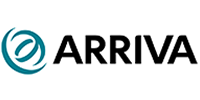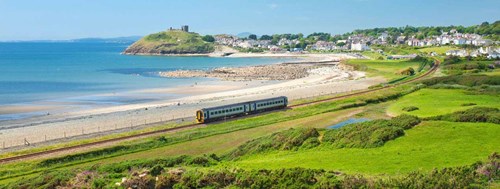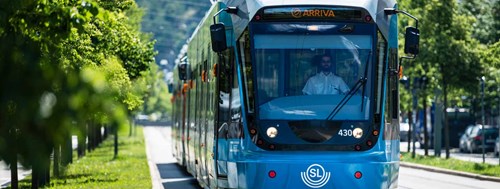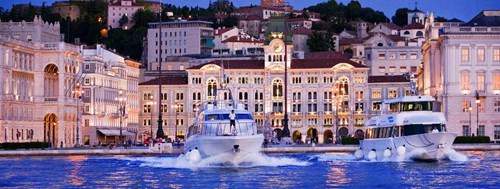Arriva

Visiting address
Admiral Way
SR3 3XP
Sunderland
Postal address
Admiral Way
Sunderland , SR3 3XP
Contact person
David MartinJoin our community for FREE today!
Create and share your own profile
Join the discussions
Publish your own items
Subscription to our Weekly eNewsletter
Get connected with Mass Transit Professionals Worldwide
FREE membership benefits
- * create and share your own profile
- * join the discussions
- * publish your own items on Mass Transit Networkmanage news, jobs, tenders, companies, events, showcases, educations, associations and literature.
- * subscribe to our eNewsletter
Company information

Arriva is one of the largest providers of passenger transport in Europe, employing more than 55,000 people and delivering more than 2.2 billion passenger journeys across 14 European countries each year.
We operate a wide range of services including local buses, inter-urban commuter coaches, local, regional and national train services, trams and light rail, waterbuses, demand response, non-emergency patient transport and airport related transport services.
Arriva is part of Deutsche Bahn (DB) and is responsible for DB's regional passenger transport services outside Germany.
Company information
SR3 3XP Sunderland
United Kingdom
8440 AP Heerenveen
The Netherlands
15405 Ferrol
Spain
195 60 Stockholm
Sweden
Solutions
- Mass Transit Operator
Product information
Bus services

Arriva operates 19,500 buses across 14 European countries. We cover everything from taking passengers to school and work, to the airport and even on sightseeing tours. Our low-floor, environmentally-friendly vehicles are making bus travel more accessible to more people every day.
Buses
- Local, commercial services
- Contracted services
- Airport – landside/airside
- School services
- Tendered services
Coaches
- Contracted services
- Private coach hire
- Tour services
- Inter-urban
A trusted provider
Arriva bus services span local and commercial routes, sightseeing tours, airports, schools and chartered journeys. Having started out in the UK back in 1980, we began our journey in the mainland Europe bus market with our first acquisition in Denmark in 1997. Our largest bus market remains the UK, with a fleet of 5,900 vehicles providing services for customers in London, the rest of England and in Wales.
More than 95 per cent of our UK buses are low-floor for easier passenger access. As part of our commitment to green energy we have also introduced 153 hybrid double-deck vehicles. In London, we run nearly 20 per cent of the bus services and cover over 60 million miles, providing 400 million passenger journeys in the capital every year.
Market liberalisation and growth
The bus market in Europe is characterised by many different regulatory environments, ranging from complete liberalisation to state-run services in countries such as Hungary and Croatia.
In areas yet to liberalise, we look to work with existing operators as part of a joint venture or via a stake in an existing business. We have successfully established Arriva as a local market contender in many of these countries and expanded our bus services across Europe as a result. For example, we were recently awarded two eight-year contracts to work with partner Videoton in Budapest, where we now have an 18 per cent market share.
Innovative services
We are already trialling hydrogen buses in the Czech Republic in cooperation with the local Nuclear Research Institute in Neratovice. In Portugal we launched a new Greenbox eco driving initiative on 250 buses in 2013 with our bus partner Transportes Sul do Tejo. This uses the latest on-board eco technology to help save fuel, energy costs and reduce CO2 emissions. In Spain we have also introduced an Ecolite fuel economy system on 217 of our DeBlas buses to reduce fuel consumption and improve overall environmental performance.
Train services

Arriva operates hundreds of local and national trains in seven European countries. We are also responsible for all of Deutsche Bahn’s regional passenger rail services outside Germany, delivering tailored services to suit local market needs.
Trains
- Rural, commuter lines
- Long distance mainlines
- Station management
- Under/Overground
- Contracts
- Maintenance
Continental reach
Our European rail network spans the UK, the Czech Republic, Denmark, the Netherlands, Poland, Portugal and Sweden. We are flexible in our approach and successfully deliver services under a wide range of business models according to the structure of each market.
The UK is our largest rail market, where we operate six different train services. These range from the CrossCountry route spanning the length of England and Scotland to London Overground Rail Operations. We also go beyond providing train services. In Wales, we are working with Network Rail and the Welsh Government on the £220 million redevelopment of the rail network around Cardiff.
The growth of deregulation
The UK passenger rail market is at a mature stage of liberalisation. It is almost fully contracted and competitively tendered, with local service providers responsible for key areas such as timetabling. Elsewhere in Europe the market is opening up to tendering at different speeds.
In some areas, such as Iberia, rail services are provided in the form of concessions or on a commercial basis. In Sweden the rail market is completely deregulated and there is widespread tendering of regional contracts. In other countries, such as Italy, early attempts at competitive tendering may have failed but as a company we continue to monitor developments so we are ready to respond to any new market entry opportunities.
Consistent performance
We are the top performing rail operator in the Netherlands and Denmark and have established an excellent record in Portugal.
In Denmark, where we operate 15 per cent of the regional network, Arriva was the first and only private company to be awarded a rail contract. In the Netherlands, where the market is mid-way through liberalisation, we have a 60 per cent share of the open market as the sole provider of regional rail services in several areas.
Tram and light rail services

Arriva runs tram or light rail services in four countries across Europe. With an excellent record of customer satisfaction and innovative passenger services, we are leading the way as markets open up to competitive tendering.
Trams/Metro
- Joint ventures
- Contracts
- Station management
- Under/Overground
- Maintenance
Success in Sweden
Sweden has a fully deregulated market and we launched our first tram operations there in 2007 when we won the Pågatåg light rail contract. In 2009 we won a second competitive contract to run tram services between Göteborg and Örebro.
We boosted our fleet of Swedish trams from two to 44 when we won the 12-year E20 contract - the country’s largest integrated multi-modal public transport tender to date serving the capital, Stockholm.
Elsewhere in Europe
Arriva runs 126 trams in Portugal and started operating the city of Porto’s tram contract, Metro do Porto, in 2010. We hold an additional interest in the Metro Sul do Tejo tram operation to the south of Lisbon. Arriva also operates six trams in Italy. All of which means Arriva is well placed to take advantage of future contracts as the market moves towards competitive tendering.
Citywide services
Arriva’s light rail services in the UK are based in the heart of the North East, serving some 40 million passengers every year. Our Tyne and Wear Metro consists of 60 stations on a network shared by national rail passenger and freight services. It became part of Arriva in 2011 and is owned and managed by Nexus, the Tyne and Wear Passenger Transport Executive. 55 Metro stations are Safer Tram Stop accredited, which recognises measures taken to reduce crime and create safe environments for customers.
Waterbus services

Arriva is responsible for waterbus routes on canals and in harbours within Denmark, Italy and the Netherlands. In each of these countries, we are using the very latest technology to ensure our passengers always enjoy the highest standards of service.
Waterbuses
- Canal/harbour buses
- Contracted services
Competitive local markets
In the Netherlands, where we run 12 waterbuses to the south of Amsterdam, around half of our routes are competitively tendered. In Italy our four waterbuses provide essential passenger services for customers in Trieste and in Denmark we operate three waterbuses in the capital, Copenhagen.
Long-term success
We are proud of our 100 per cent contract retention rate in Italy. Our contract for daily and seasonal waterbuses in Trieste was extended in 2011 to run until 2015. In partnership with the local authorities, we have also developed and introduced new technology to improve punctuality and passenger information.
Award-winning service
Arriva’s Danish waterbus operation recently received an infrastructure category diploma from The Organisation for the Enhancement of Copenhagen. The award was made for the way Arriva services link parts of Denmark’s capital city together to offer an alternative route for crossing the harbour. In 2013 Arriva re-won the tender for the Danish waterbus contract, which covers a further three years from 2014 with a possible three-year extension after that.
Press releases
- Arriva impresses at UK Bus Awards
- New fleet of electric buses arrive in Liverpool
- Arriva wins northern rail concession in The Netherlands worth 1.6 billion euros
- Arriva wins Swedish rail franchise worth 550 millions euros
- European transport operator Arriva reports continued growth and investment in 2016
- Simply click for new Arriva service
- Arriva introduces world's first virtual reality platforms in support of train passenger safety across Wales
- North East first to benefit as Arriva launches contactless payment
- Arriva Netherlands begins operating multi-modal Limburg contract
- Passengers set to benefit as Arriva takes over London Overground Concession
- Arriva comments on CMA final decision on Northern Rail Franchise Award
- Arriva expands bus presence in Spain through acquisitions
- Acquisition expands Arriva's Czech Republic business
- Arriva welcomes Direct Award for the Crosscountry Franchise
- Arriva signs bus alliance agreement in Merseyside
- Arriva backs national 'Britain runs on rail' campaign
- Arriva Italia sign GoGoBus partnership agreement
- Arriva expands bus presence in Italy through acquisition
- Arriva announces Managing Director for new Northern Franchise
- Northern Franchise awarded to Arriva
- Arriva strengthens in the netherlands following £1.4 billion bus and rail contract award



